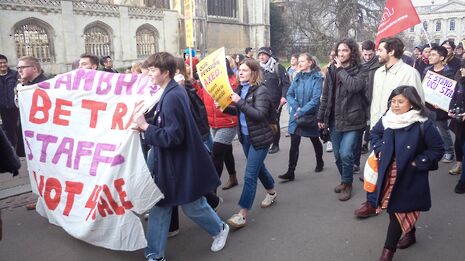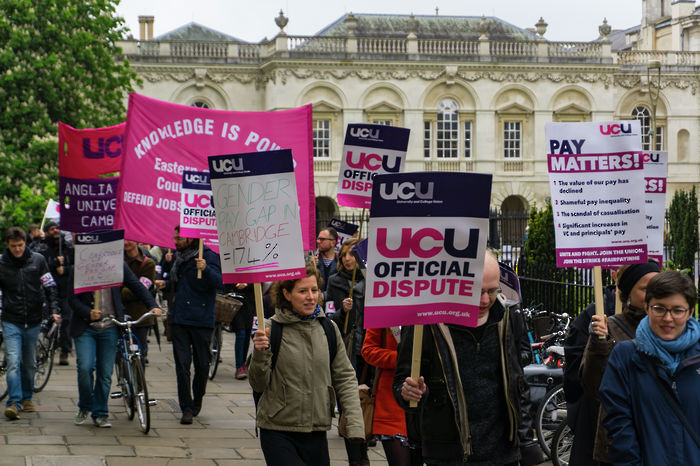Cambridge vice-chancellor insists ‘no collusion’ to push for pension reforms
A leaked email has surfaced appearing to show college bursars being encouraged to advocate the pensions scheme reforms

The Cambridge Bursars’ Committee has hit back against accusations that colleges created a “misleading prospectus” during the consultation period on the reforms to staff pensions which are the subject of a nationwide strike.
University vice-chancellor, Stephen Toope, emailed staff, saying: “Cambridge has a limited ability to influence the process that has led to this situation. I want to assure you categorically that there has been no collusion between Cambridge and Oxford to undermine the scheme.”
An email leaked earlier this week from the Bursar’s Committee Pensions Sub-Committee to college bursars appeared to encourage a coordinated response to the Universities UK (UUK) survey in support of a move towards the defined contribution scheme, which has drawn the ire of the Universities and Colleges Union (UCU).
Cambridge UCU Branch Secretary Dr. Waseem Yaqoob told Varsity that the recommendations made by the Pensions Sub-Committee raised “a question about the internal democracy of the university,” arguing that, if certain college bursars did not consult their college’s Governing Body and fellows prior to sending feedback to UUK, they “circumvented” the collegiate system “in order to attack staff pensions.”
However, Dr. Keith Carne, secretary of Cambridge’s intercollegiate Bursars’ Committee, addressed the responses on the part of some individual colleges, saying: “We were not told that this would be done on a one-employer, one-vote basis; we were asked to respond to a survey.” Varsity is currently awaiting response from UUK on the methodology used to take different responses into account.
Proposed changes to university staffs’ pensions catalysed nationwide strikes, called by the UCU, which hit 64 universities nationwide yesterday, and which will continue until mid-March. Academics are striking in order to put pressure on universities to reject UUK’s proposal to replace defined benefit pension schemes for university staff incomes under £55,000 with defined contribution pension schemes.
The pensions reform proposal put forth by UUK was based on a consultation over the future of its pension scheme, the Universities Superannuation Scheme (USS) sent out in September to more than 350 employers. Its decision to “take a more moderate approach to risk” was informed by the responses of 116 institutions, with 42% of these institutions (totalling 49) wanting “less risk to be taken.” At least 16 Oxbridge colleges were among those who called for less risk.
UUK cites a deficit of £7.5bn in the national pension scheme for university staff, however the UCU, the higher education union for pre-1992 university staff, dispute this figure as overly pessimistic.
Under the UUK pension proposals, university staff will see the value of their defined contribution schemes vary depending on returns from underlying investments in the stock market, rather than be guaranteed a retirement income under previous defined benefit schemes. This change to pensions enables universities to individualise risk.
Speaking to Varsity, Dr. Carne, emphasised that in advocating for pensions reforms, colleges were “concerned about the risk to the USS pension scheme, not the risk to particular investments” in the stock market.
The Bursars’ Committee is an intercollegiate body, without a University representative, which facilitates college bursars’ spending decisions and offers advice on topics like pensions and employment law. It is not officially part of the central University, but its representatives sit on many of Cambridge’s other committees.
Dr. Carne elaborated on one of the UUK’s alternative proposals to put up universities’ contributions to 35%, which he assesses would bankrupt “certainly a lot of other universities.” He argued that the UUK’s plan was not “a sign of solidarity with other academics,” and noted that the sub-committee wanted “to find the best of what unfortunately looked like a series of unattractive options.”
Earlier this week, Financial Times pensions correspondent Josephine Cumbo revealed the UUK had confirmed that “Oxbridge colleges accounted for one third of the total wanting less risk.”
Given that Oxbridge colleges are considered employers in their own right by the USS, they were able to respond to the September consultations in the same manner as other, separate universities. However, it is unclear to what extent the feedback by Oxbridge colleges is weighted against that of larger institutions by UUK.
However, the independence of the colleges involved is now seriously being brought into question, with talk of a concerted effort to provide information promoting the more moderate approach to risk.
In an article published on the 21st February, Michael Otsuka, Philosophy Professor at the London School of Economics, alleged that Cambridge colleges coordinated a rejection of USS’s proposed level of risk.
He referenced the leaked email sent by St. Catharine’s College bursar Simon Summers to other college bursars, which contains a “suggested response to the current consultation” from the Pensions Sub-Committee. The email also claims that the Trustees of UUK were “overestimating the medium term credit quality of the Higher Education sector, and using very aggressive assumptions to provide options for the next set of benefits and contributions.”
The suggested response recommended that “all Colleges aim to respond to the consultation”, “... a strong move towards [Defined Credit] now”, and that bursars may “wish to consider how to achieve a consensus view in your College about the issues facing the Scheme, during Michaelmas Term”.
Otsuka claimed that the separate inclusion of Oxbridge colleges allowed the UUK to create a “misleading prospectus” – and consequently enabled the Universities Superannuation Scheme (USS) to “speed up the ‘de-risking’ of the portfolio.” He notes that 73% of Oxbridge “institutions” (including constituent colleges alongside the central universities) registered “opposition to the mutuality of USS’s last-man-standing arrangement.” The last-man-standing arrangement of defined benefit schemes was considered to expose Oxford and Cambridge “to too much risk arising from ‘weaker’ universities.”
He wrote: “It should be a special concern for USS members beyond Oxford and Cambridge if these two institutions exercised such disproportionate influence.”
Speaking to Varsity, Summers argued that the figures provided by Otsuka “do not seem [to] support the suggestion that ‘Oxbridge’ played a central role in the outcome”, adding that “the role of the Pensions Regulator in influencing the assumptions adopted in the latest USS valuation should also be recognised”.
Update: @UniversitiesUK has told the FT that Oxbridge colleges accounted for one third of the total wanting less risk.
- Josephine Cumbo (@JosephineCumbo) February 21, 2018
It added that Oxbridge colleges “are employers in their own right”.@MikeOtsuka
A spokesperson for the University told Varsity: “The University is not pushing to leave USS, and was one of more than 350 institutions to respond to UUK’s employer consultation on the future of the scheme. Cambridge Colleges are autonomous, self-governing institutions that made separate submissions.”
 News / Cambridge academics sign open letter criticising research funding changes22 February 2026
News / Cambridge academics sign open letter criticising research funding changes22 February 2026 News / Student and union protesters hold ‘Trans Liberation Solidarity Rally’ 24 February 2026
News / Student and union protesters hold ‘Trans Liberation Solidarity Rally’ 24 February 2026 News / Union speakers condemn ‘hateful’ Katie Hopkins speech14 February 2026
News / Union speakers condemn ‘hateful’ Katie Hopkins speech14 February 2026 Features / Beyond the porters’ lodge: is life better outside college?24 February 2026
Features / Beyond the porters’ lodge: is life better outside college?24 February 2026 Theatre / Footlights Spring Revue? Don’t Mind if I Do!25 February 2026
Theatre / Footlights Spring Revue? Don’t Mind if I Do!25 February 2026










